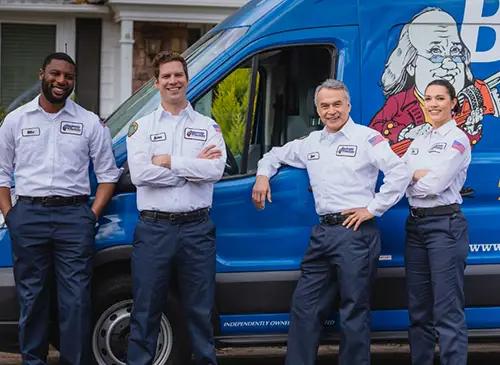 Does the hot water run out in your Pompano Beach, Florida, home before your family finishes bathing in the morning? Do you have to run the dishwasher and washing machine separately to ensure there is enough hot water? If so, your water heater is too small. If you are buying a new one, work with a professional to calculate the size needed for an adequate hot water supply for your household. The professional plumbers at Benjamin Franklin Plumbing of Margate, Florida, will discuss your lifestyle, family schedules, appliances and budget to help you select a water heater that will meet your needs.
Does the hot water run out in your Pompano Beach, Florida, home before your family finishes bathing in the morning? Do you have to run the dishwasher and washing machine separately to ensure there is enough hot water? If so, your water heater is too small. If you are buying a new one, work with a professional to calculate the size needed for an adequate hot water supply for your household. The professional plumbers at Benjamin Franklin Plumbing of Margate, Florida, will discuss your lifestyle, family schedules, appliances and budget to help you select a water heater that will meet your needs.
Factors That Influence Water Heater Sizing
Several variables influence the size of the water heater that will serve your needs. Our plumbers determine the appropriate size by calculating the variables that affect optimum hot water delivery. We consider the number and ages of family members, the number of bathrooms and when the demand is greatest. We factor in the appliances you use regularly that require hot water, such as washing machines and dishwashers. We also discuss the types of water heaters available and help you select equipment that will work well in your home.
Tankless Water Heaters
Tankless or on-demand water heaters do not heat and store water. Instead, they heat water when you turn on the tap or start the dishwasher or washing machine. If space is a problem, tankless water heaters are compact. They can be mounted on a wall or easily fit into a corner.
Although tankless units cost more, they can reduce energy bills because they do not heat large quantities of water at a time or require standby energy to keep the water hot. They have a long service life, typically more than 20 years. In addition, readily available replacement parts make them easy to repair, a factor that can extend the service life.
Sizing Demand-Type Water Heaters
Sizing demand-type water heaters is based on temperature rise and flow rate. Tankless units have lower flow rates than storage water heaters. Instead of one large storage water heater, we may recommend installing two or more on-demand units serving specific needs, such as a washing machine, hot tub or dishwasher.
Demand water heaters can be powered by electricity, natural gas or propane. Compare fuel costs in your area to determine which will be most economical for you.
Storage Water Heaters
Storage water heaters heat a large quantity of water and use standby energy to keep it hot. They are sized by volume of water and the first hour rating. The FHR indicates the quantity of water the unit can produce per hour. The supply per hour depends on the capacity of the unit, the type of fuel used to heat the water and the size of the burner or heating element. They can be powered by electricity, natural gas, propane or fuel oil.
Storage water heaters have a life expectancy of 10 to 15 years. Large-capacity storage water heaters need a large space. They are often installed in a garage, utility room, closet or bathroom.
Calculating the First Hour Rating (FHR)
We calculate the FHR according to usage by activity or appliance:
- Showering: 20 gallons per person
- Automatic dishwasher: 7 gallons
- Top-loading washing machine: 25 gallons
- Shaving: 0.05 gallon per minute
- Food preparation: 3 gallons per minute
The FHR should meet or exceed the number of gallons required to supply the demand of the busiest time of day.
The FHR for heat pump storage water heaters is calculated the same way. However, heat pump water heaters use less energy and have lower operating costs. Geothermal heat pumps are even more energy efficient.
Advantages of Proper Sizing
Properly sized water heaters will not only better serve the needs of your household but will also operate more efficiently. Water usage for a typical household averages 64 gallons per day. Heating water is the second-largest utility expense, accounting for 14% to 18% of utility costs. Choosing a type of water heater that is sized to meet your needs can save several hundred dollars a year on utility costs. Keeping your water heater well-maintained can maximize energy efficiency, extend the service life and help achieve consistent temperatures.